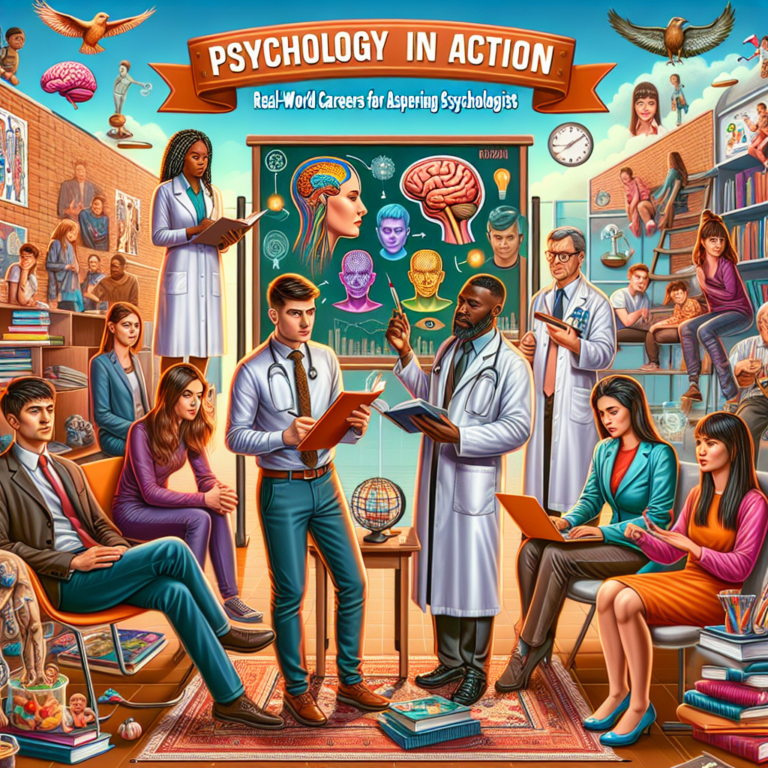
Introduction
In an era defined by rapid change and complex social dynamics, the need for deeper insights into human behavior has never been more crucial. Understanding the psyche unlocks the potential for transformative change—not just for individuals but for communities and societies. This is precisely where a Master’s in Psychology becomes essential. By pursuing this advanced degree, students embark on a journey that goes beyond academic achievement; they step into the forefront of personal and societal transformation.
In this article, we will explore the multifaceted impact that a Master’s in Psychology has on both individuals and communities. We’ll delve into its practical applications through compelling case studies, uncover the psychological theories that underpin effective practice, and provide insights into the unique advantages this degree offers.
Prepare to discover the profound ways that “Unlocking Minds: The Transformative Power of a Master’s in Psychology” paves the path for you to create meaningful change.
The Need for Psychological Expertise
The Changing Social Landscape
Today’s world is characterized by increased mental health awareness, evolving interpersonal relationships, and the continuing integration of diverse backgrounds in workplaces. According to the World Health Organization, the prevalence of anxiety and depression has surged, making mental health professionals more critical than ever.
The Role of Psychology in Society
Psychology is the science of the mind, which fundamentally influences behavior and interactions. With a Master’s in Psychology, professionals are equipped to address mental health needs, contribute to policy development, and foster community well-being. The transformative power of this degree allows practitioners to not only diagnose and treat conditions but also to advocate for systemic changes that positively affect mental health landscapes.
Unlocking Minds: Core Curricula of a Master’s in Psychology
Essential Courses and Learning Outcomes
A Master’s in Psychology offers a rich tapestry of courses designed to equip students with the necessary skills. Key courses often include:
| Course Title | Description | Skills Developed |
|---|---|---|
| Developmental Psychology | Study of human growth and changes across lifespan | Understanding human development |
| Abnormal Psychology | Examination of mental disorders and their effects | Diagnostic skills |
| Research Methods in Psychology | Techniques for gathering and analyzing data | Data analysis, critical thinking |
| Counseling Skills and Techniques | Practical methods for therapeutic interactions | Communication, empathy |
| Social Psychology | Exploration of social behaviors and dynamics | Interpersonal skills |
The careful selection of courses prepares graduates to tackle varied human issues and broadens their perspectives on mental health.
Real-World Application: Case Studies
Case Study 1: Utilizing Cognitive Behavioral Therapy (CBT)
Background: Sarah, a Master’s in Psychology graduate, specializes in CBT. She began her practice in a community clinic focusing on anxiety disorders.
Application: By implementing structured CBT techniques, she helped numerous clients break free from debilitating thought patterns.
Analysis: This case illustrates how theories learned during coursework can directly translate into effective therapeutic techniques, showcasing the transformative power of a Master’s degree.
Case Study 2: Organizational Psychology and Workplace Wellness
Background: Michael, also a Master’s graduate, used his expertise in organizational psychology to develop wellness programs at a tech firm.
Application: His initiatives included stress management workshops and team-building exercises.
Analysis: This demonstrates the versatility of a psychology degree, showing its transformative potential not just for individuals but for organizational culture and productivity.
Psychological Theories That Empower Transformation
Understanding key psychological theories enhances the skillset gained from a Master’s in Psychology. Familiarity with these models helps graduates apply theories to real-world problems.
Behavioral Theory
Behaviorism focuses on observable behaviors rather than internal states, highlighting the role of reinforcement and punishment. This theory is instrumental in designing behavioral interventions in educational settings.
Humanistic Psychology
Focusing on self-actualization, humanistic inquiry emphasizes personal growth. Practitioners trained in this approach can facilitate profound personal transformations.
Systems Theory
This theoretical framework helps address complex social phenomena, allowing graduates to design comprehensive intervention strategies that respond to multi-layered human challenges.
The Impact of a Master’s in Psychology on Personal Development
Emotional Intelligence Growth
Pursuing a Master’s in Psychology inherently fosters greater emotional intelligence. Students learn to not just understand others but to reflect on their own emotions, thereby enhancing self-awareness and empathy in personal and professional relationships.
Enhanced Problem-Solving Skills
The advanced analytical skills gained from a psychology degree prepare graduates to approach problems with structured frameworks. This adaptive thinking ensures that they tackle challenges innovatively and effectively.
Case Study 3: Personal Transformation through Self-Awareness
Background: Lisa, who pursued a Master’s in Psychology, initially entered the program confused about her career path.
Application: Through self-exploration and therapeutic techniques learned in her studies, she transitioned from feeling lost to becoming a confident coaching professional who assists others in finding their purpose.
Analysis: Lisa’s journey underscores how a Master’s degree facilitates personal breakthroughs, epitomizing the transformative power of understanding the mind and emotional processes.
The Community Impact of a Master’s in Psychology
Creating Systemic Change
Graduates often use their skills to advocate for community mental health initiatives, contributing to social policy and public health strategies.
Case Study 4: Advocating for Mental Health Awareness
Background: Thomas worked with a nonprofit organization that aimed to improve public understanding of mental health issues.
Application: He leveraged his expertise to create educational campaigns, drawing upon both his research skills and a deep understanding of social psychology.
Analysis: This showcases how those armed with a Master’s in Psychology can lead community efforts that change lives and perceptions surrounding mental health.
Building a Network of Support
By being part of impactful projects and initiatives, Master’s graduates often build networks that can sustain long-term change.
Career Opportunities: Beyond Traditional Roles
Many envision a Master’s in Psychology leading to clinical roles, but the scope extends far beyond that. Graduates can pursue numerous fulfilling paths, including:
- Clinical Psychologist: Providing therapy and assessment.
- Industrial-Organizational Psychologist: Applying psychology in business settings.
- Researcher: Contributing to the academic body of psychology.
- Consultant: Offering expertise in various capacities.
Data on Employment Opportunities
| Career Path | Expected Growth Rate (2019-2029) | Median Salary |
|---|---|---|
| Clinical Psychologist | 3% | $77,030 |
| I-O Psychologist | 2% | $97,260 |
| Researcher | 8% | $85,200 |
| Consultant | Varies | N/A |
Conclusion
The ever-evolving landscape of human behavior and mental health requires skilled professionals who can adapt and innovate. A Master’s in Psychology serves as a gateway to unlocking minds, offering students the tools, insights, and experiences needed to foster profound change—not only in their own lives but in the lives of others and the communities in which they operate.
Now is the time to consider this transformative journey. By committing to study and apply psychology, you can join the ranks of those who harness “Unlocking Minds: The Transformative Power of a Master’s in Psychology” to make a lasting impact in a world that needs it.
FAQs
1. What can I do with a Master’s in Psychology?
A Master’s in Psychology prepares you for various careers, including clinical psychology, counseling, organizational psychology, and research positions.
2. Is a master’s degree necessary for a career in psychology?
While some positions require advanced degrees, others may be accessible with a bachelor’s degree. However, a Master’s in Psychology enhances job prospects significantly.
3. How long does it usually take to earn a Master’s in Psychology?
Typically, a Master’s in Psychology takes 2-3 years to complete, depending on the program structure and whether you study part-time or full-time.
4. Can I pursue a Master’s in Psychology online?
Yes, many reputable institutions offer online Master’s in Psychology programs, allowing for greater flexibility in study schedules.
5. What are the financial aid options for pursuing a Master’s in Psychology?
Students can explore federal loans, scholarships, and assistantship programs. Many universities also have financial aid offices to assist prospective students.
In seeking to understand the mind, we not only unlock personal potential but contribute to a broader societal transformation. The journey begins with education and culminates in meaningful impact—one mind at a time.













